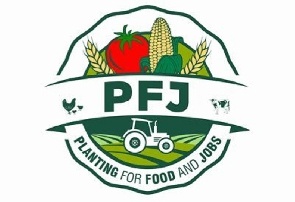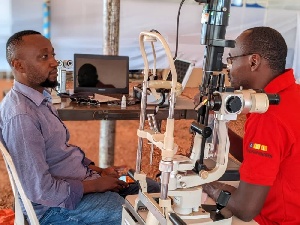- Home - News
- Elections 2024
- News Archive
- Crime & Punishment
- Politics
- Regional
- Editorial
- Health
- Ghanaians Abroad
- Tabloid
- Africa
- Religion
- Photo Archives
- Press Release
General News of Monday, 7 April 2025
Source: www.ghanawebbers.com
GH¢2.8 billion invested in PFJ Phase 1

Planting for Food and Jobs
Ghana invested GH₵2.8 billion in the Planting for Food and Jobs (PFJ) initiative. Despite this, the country still imports large amounts of grains and staple foods.
Dr. Amos Rutherford Azinu is a Seed Business Executive at Legacy Crop Improvement Centre (LCIC). He noted that PFJ increased some crop production but did not achieve self-sufficiency.
In an interview with the Ghana News Agency, Dr. Azinu discussed key challenges facing PFJ. He mentioned poor storage infrastructure causing post-harvest losses. Estimates suggest 20 to 30 percent of increased production is lost before reaching markets.
He also pointed out insufficient processing capacity limits converting raw produce into storable goods. Distribution bottlenecks prevent efficient movement from farms to urban areas. Additionally, reliance on subsidies creates unsustainable cost structures instead of lasting agricultural systems.
Limited market integration has failed to connect increased production with commercial buyers effectively. Launched in 2017, PFJ aimed to transform Ghana's agriculture sector significantly.
As President John Dramani Mahama's government prepares the Feed Ghana project, Dr. Azinu emphasized learning from PFJ’s failures. He suggested that investments should cover storage, processing, and distribution as well as farm inputs.
Creating integrated value chains can help reduce imports by ensuring increased production is utilized effectively. He stressed prioritizing climate resilience through drought-resistant crops and sustainable farming practices.
Dr. Azinu called for data-driven implementation to improve targeting of interventions rather than using blanket solutions. Stronger collaboration with private agribusinesses is essential to address processing and distribution gaps hindering PFJ’s success.
He also advocated for a strategic import substitution approach focused on high-import crops with strong domestic potential. Reflecting on the GH₵2.8 billion investment in PFJ, he emphasized that agricultural development must consider the entire ecosystem.
For Feed Ghana to succeed, it should not focus solely on crop yields but also on broader agricultural issues. Discussions about agricultural transformation are crucial as stakeholders aim to enhance food security and reduce reliance on imports in Ghana.










